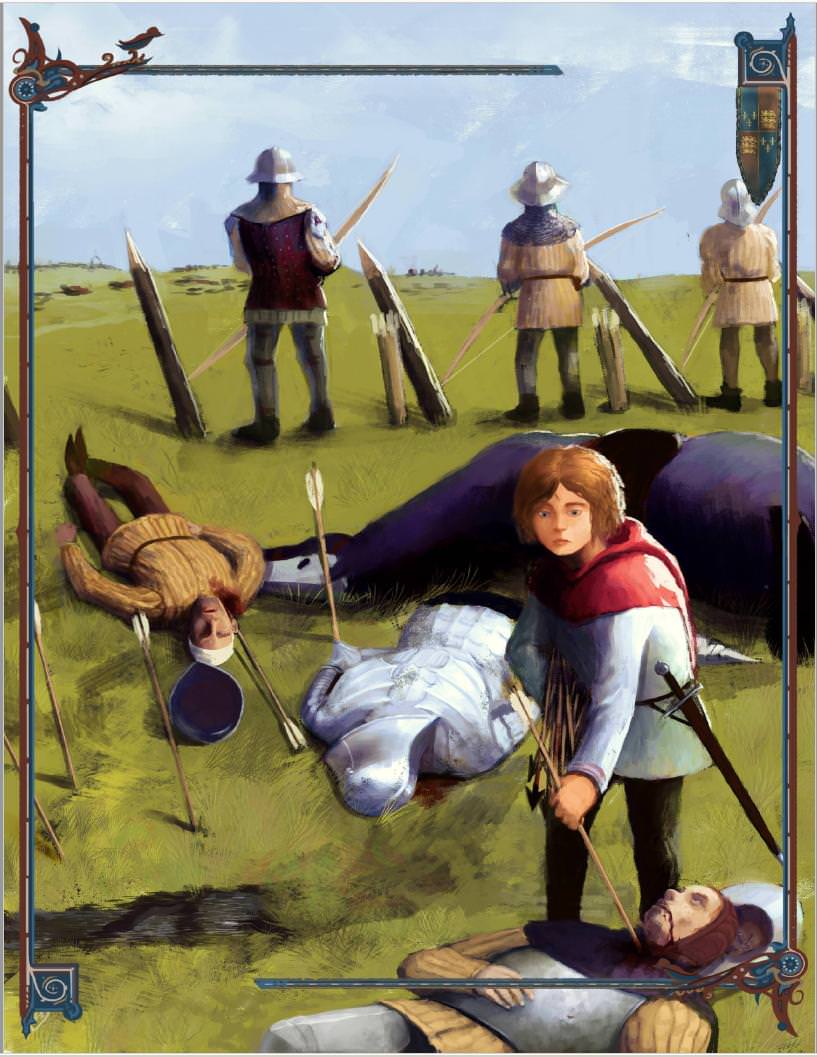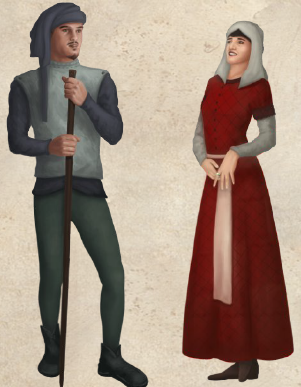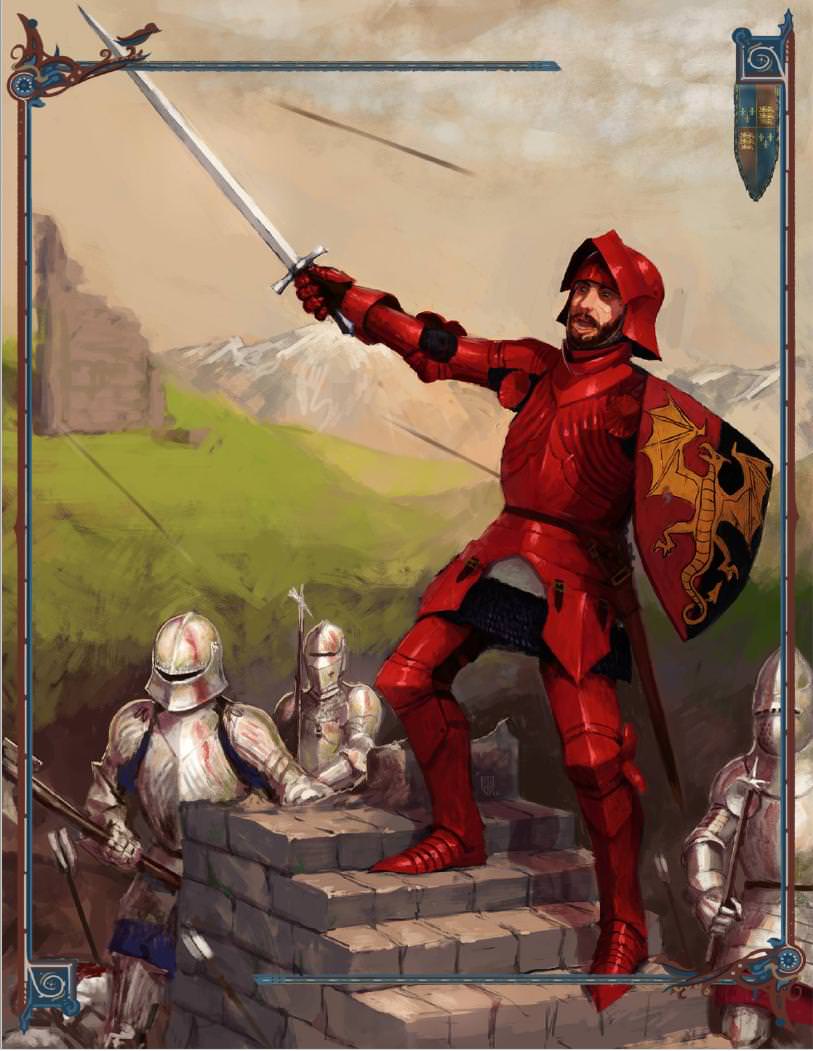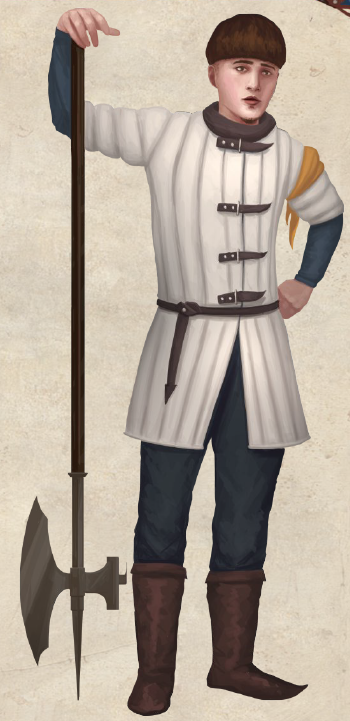Middenarde: New Edition by PurpleXVI
libeling his trademark
Original SA postThuryl posted:
Has he at least given some kind of undertaking that even if you write things he doesn't like, he's not just gonna yell at you until you take it down again?
He's a jackass and he can threaten to sue me all he wants for "libeling his trademark." He didn't even notice that I'd already crossposted it to another site alongside the SA review. Admittedly another site where it's limited to worse formatting but that doesn't really change the fact that I'm calling his game garbage.
So, let's get back to it with...
Middenarde

So, what's changed? At least there's slightly nicer formatting now. The art is mostly still the same(though now supplemented with some more art by a worse artist), but every page has a generic-but-not-offensive brown parchment background, which makes the whole thing look a bit less like someone edited it in MS Word. It's also been rendered... somewhat less fun. Remember the Knacks? The only thing we could all have a laugh at and imagine playing and have some fun with? Completely erased. Completely and utterly erased. The intro's also been changed to be slightly less fascinated with how you're going to die face-down in the mud and suffering from the pox.
Middenarde posted:
The fantasy aspect comes into play because the game assumes that all the supernatural elements believed to be real during that time period were, within reason, actually existent. However, because we know that these magical forces did not significantly impact the course of history, they must necessarily be reclusive and rare, difficult to find and harder to master. Therefore, Middenarde is designed so that magic is something that requires significant investment and has limits on its power and availability. The mythical creatures in Middenarde are uncommon and shy away from civilization, found mainly in the untamed and unexplored wilderness, where there be dragons.
...
In the typical fantasy story, the heroes are talented from birth, and they traipse easily from dungeon to dungeon, solving everyone’s problems and accruing incredible power. It’s very rare for them to die, and when they do, it’s a momentous occasion with plenty of build-up. Every dungeon they visit, however, is loaded with the skeletons of those who came before them, and yet the heroic adventurers are always the ones who end up exploring it successfully, and exit no worse for wear in the long run. In Middenarde, the difference between life and death can be a single moment even under the best circumstances, and you have more in common with the skeletons those adventurers walk past than you do with the heroes.
The author's still an insufferable jerkoff about it, though. There's also the addition that now, apparently, the GM is supposed to quiz the players about what their characters had for lunch and when they last had something to drink. And if they lack a satisfactory answer, they're to be penalized for it. And even if you do have a good answer, you might be stuck with vaguely defined malnutrition penalties. Great, isn't it?
Middenarde posted:
To separate living things from inanimate objects, living things have Vitality Points (representing their wellness and ability to function), and objects have Health Points (representing their structural integrity).
And stuff like this. Who cares if the door loses Hit Points or Wood Points when you bash away at it with an axe? They're fucking not-broken-to-pieces points in either case! Speaking of broken stuff, weapon and armour repair are slightly less shit now? In that items aren't guaranteed to lose any quality levels unless completely shattered and needing to be fixed from broken shards. I mean, weapon and armor durability and repair in a PnP RPG is still terrible fucking bookkeeping, but it could be worse.

This is some of the new art. Look at those hideous borders.
You know what else he decided to add, though? Between-chapters fiction. With, uh, what's it called when someone writes out an accent, like leaving out someone's h's and stuff? It's got that thing. It hurts to read.
Middenarde posted:
“Y’can’t read or write, ya daft yaldson. Scribbling’s all you’d do. It hasn’t got any pictures. Right now all it’s got going for it is a sarding lout keeping me from reading it.” His companion twists his body away from the campfire, holding the parchment up and squinting at it. “If the coistrel in Birming’am who sold it to us was worth his salt, it’s ‘round here somewhere.We’ll find it in the morning. I’m just trying to figure out what we’ll have to go through once we do. If I was some eccentric wealthy fop, not sarding likely I would just leave all my treasure lying about for anyone to grab.” He sighs, his one remaining arm dropping into his lap with a flutter of parchment and the dull thud of leather on chainmail. “Can’t make anything interesting out. Just some poem about bones. Bloody useless.”
...
“Damn you, Alex!” he shouted as more steel forced its way into his body. “Damn you, Paul, and your buried treasure!” Blood flowed into his mouth, metallic and tangy, and leaked out the corner of his lips. “Damn the – ancient shit that – built this accursed place,” he managed, choking on his own blood, his sword falling from his hand and clattering on the stone. As his body slumped after it, still being ruthlessly stabbed by the undead, the torch faltered and died in the damp.
Not to mention that while the vocabulary may be period-appropriate, it just reads like the author tried to jam in as many archaic words to remind us that HEY GUYS, IT'S YE OLDEN TIMES!!!!! And I like how in this Realistic-But-Not-Really RPG, the guy still has time to rant out like half a paragraph of curses and complaints while choking on his own blood and being stabbed repeatedly to death by a skeleton warrior.
Next up is the setting overview, which sucks a bit less now. But still goes off into armchair-psychology tangents about how people accused the poor, the weird and those with Down's of being witches because of their own subconscious guilt over not helping them. There's still the goddamn entire weird dickshoes sidebar, however, which is either a bonus or a negative depending on how you view it.

Great addition to the art, man.
There are more changes, of course, but because of how long it's been since the original review, it's taking me some time to compare and contrast, because I have to keep checking that I'm not misremembering anything. Here's the great part, though, the magic system has been revamped. So look forward to THAT.
Malnutrition checks
Original SA post Middenarde
And so we resume the Middenarde... re-review?
Middenarde posted:
In Middenarde, no characters are intended to be “heroes” at their inception. In fact, most characters will not even be the master of their own destiny, and will have to struggle for their very survival. It’s likely that no one outside of their family and close friends even knows who they are or will remember them when they are gone.
Like, LITERALLY, I cannot think of any other game that's gone through so much effort to establish that you shouldn't even be bothering to play the game. "You won't really get to make any decisions, nothing you do will matter, and no one will remember you when you inevitably fail. Have fun, kids!" He does follow up with "but wait! maybe your character will grow and eventually become something cooler! the odds of that are low, though." The character creation chapter is also, somehow, worse, since it makes an example character... but good luck browsing through all those paragraphs for the small amounts of info that are relevant to actually making your own. It doesn't even have the sort of summary at the end that White Wolf games had, which neatly lists how many points you have to spend in each category of your sheet.

This guy looks like he has no idea where he is, and also like he's about to take an arrow to the eye.
The rules for playing the game, rather than starting off with how we fight people, or generally accomplish tasks, or maybe a skill list, decide to dive headfirst into the crafting rules instead. It was a mess before, and it's still a goddamn mess, except a slightly remixed mess.
One major change, however, is "Luck" points. Basically, every character has an equivalent of Fate points, etc. that they can spend to improve the odds in their favour, EXCEPT, their Luck points' potential effects are modified by their "ancestry." We can be Anglo-Saxon, Celtic, Norse or Roman in ancestry. Each ancestry can spend their Luck points to add a point to a skill roll(but which skills are included vary per ancestry, Romans, for instance, can only improve their crafting.), and they have two additional things they can spend their Luck points on. Anglo-Saxons suck, to put it shortly, they can spend their Luck to gain an extra "half-turn" in combat, but the only thing you can do with a "half-turn" maneuver is shoving people, no actual attacks or other useful things, and they can recover health as though they rested for a full day, instantly(PS: It took me a ridiculous amount of fucking time to find out where it said how much this actually was, since there's no appendix. It turns out to be a percentage of your total health. Where's your total health listed? Only, as far as I can tell, on the linked Google Docs spreadsheet with its 11 fucking hit locations.) which is negligible. Celts, on the other hand, are pretty useful, since they get to multiply any damage done by 2 or 3(depending on the weapon). Nords are also garbage, since they can reflect half of any damage they take... which requires them to get hit, at which point they've probably lost a fucking arm or something and are dead anyway. Absolute garbage. Meanwhile, Romans get to just completely no-sell any attack, negating all damage from it. The whole "add a point to a skill roll"-thing is also pretty minor since they're 3d6 rolls vs variable TN's and no ancestry gets to boost combat skills. And you start with all of one Luck point(also only noted on the fucking spreadsheet, jfc you moron).
Middenarde posted:
Spent luck can only be replenished at the GM’s discretion and through character advancement, so do it wisely.
So considering that you probably won't ever replenish your Luck except for gaining more as you level up, it really only makes sense to spend it on "certain" things like Celtic super-damage and Roman invincibility.

Why would he ruin the book with this shit when there's all the great watercolour art already?
Middenarde posted:
Regardless of whether they had enough to eat or drink, characters must also roll to avoid contracting malnutrition, a disease which is described in section 4.12. Add the malnutrition rating (MR) of every meal they ate together, rounded up, then subtract the penalties from whatever they drank, to get the malnutrition DC.
I also just wanted to quote this because it feels downright offensive. It's like I'm looking into an alternate reality negaverse of inverse fun. Also, while trying to figure out how much falling damage could be negated by wearing full plate(since nothing says your armor doesn't apply to falling damage), I had to spend five minutes re-reading the armour table until I realized that the explanation of everything on the table was two pages away. Rather than, as previously, more or less on the same page. So congrats, Mr. Quill, you managed to make an equipment table hard to read. But in the end I did figure out that you need to be at least fifteen meters above the ground for a fall to be lethal(at twelve, it can only knock you unconscious, and below that it can't kill you). Add another six meters if you're wearing masterwork boots and land on your feet.
Combat between two incompetent attackers but accomplished defenders can still lead to an infinite counter-attack loop that must look like some sort of incredibly sped-up dance-off. Actually attacking someone is still someone dense: For a normal, un-aimed attack, expect to roll to-hit, to-dodge(or block), to-damage(then spend time noting everyone's equipment damage resulting from it), roll to bleed/sever. So four rolls and up to five values(weapon, armor, health, bleed counters, adjustments for severed or destroyed body parts). Combat also still decides to use a completely different mechanic from the rest of the game, by having separate attack/block/dodge dice pools, rather than using the 3d6+modifier that everything else in the game uses. This is presumably for a reason and not just because the author is a moron.
Overall, combat is mostly still the same, though, except for magic. But we'll get to magic.
Skills are still dumb, for instance, you sense a dragon with your CAPACITY TO NOTICE THE SUPERNATURAL rather than, you know, hearing or seeing the giant fucking lizard coming your way. The game explicitly says we shouldn't be rolling for easy, commonplace stuff, but half the descriptors for "easy" skill use is still stuff I would never demand a player roll for unless I wanted to harry them into quitting the game(literally, "running up a staircase" is an example). Cunning also still has the very D&D-esque reference to "pits of bubbling green acid" for its easy example.
Also, by default, poor people have less integrity than the rich, simply because bribing people is measured in days of pay, and it's just a hard set rule that it happens. So as long as you can afford more than one day's wage for someone, you can bribe them.
And for some reason we now have four perception skills. One for social perception(Psychology), one for magical perception(Attunement) and two overlapping general perception skills(Cunning and Vigilance). They also make up four of the six skills in the Mental skill category, making it more or less irrelevant. The fifth Mental skill is "Willpower," which requires a DC12 roll to "make a difficult decision." Does that mean I need to roll, as a player, if my character is going to make a difficult or painful situation, and the GM tells me that I don't get to make the decision if I fail it? The mind boggles.
But lastly, we've got the part that he actually, really, majorly changed somewhat on my advice. Magic! The old D&D magic is mostly scrapped in favour of Witch Magic, Christian Magic, Heretic Magic and Satan Magic. Anyone can be a Witch simply by levelling up Attunement, presumably the limited number of witches is because the Witch/Hedge magic kind of sucks. It's a bunch of incredibly minor cantrips, stuff like "ignore malnutrition checks twice a week" or "gain a +1 to animal handling twice a day." If you expend three level-ups on Attunement, for instance, you get to do as much damage to a wooden door twice a day as you could just by hitting it with an axe. Or at six level-ups worth, you can make someone sterile! Really comforting to know, as some bandit buries a knife in your gut, that he's never going to have kids.
Alternately, you can use Christian Magic, which allows you to collect Church Mana(tm), also known as Piety, by being a good guy. Access to Christian miracles is earned entirely by spending your Piety(of which you can gain two points a day), rather than level-ups, though each Christian spell still has a casting DC so some of them may be hard to pull off as a starting character. The only real limit here is that earning Piety is entirely turned over to GM fiat(good stuff is defined as "that which pleases God," no judgment on whether we're following the Old Testament, New Testament, the Pope's judgments or what. This really needs some more detailing, otherwise we're into Fantasy Wargaming territory), more or less, so it's not really a system we can game too easily. But technically, a good week of being incredibly faithful(earning our maximum of two points of Piety a day) and never sinning could give us the necessary worshipper rank to resurrect the dead or cause people to be dragged to hell by demons, the latter of which is based entirely on whether the victim can dodge the demons reaching out of Hell for them, not on whether they're a sinner or not.
Heretic Magic is thinly refluffed Vancian casting, where the pagan deities don't give a shit who you are or what you do. As long as you know the necessary ritual of worship and worship appropriately when you wake up(and of course you have a limited number of gods you can pray to each morning...), you'll get access to their miracle until it's been used up to its limited number of applications! The Pagan gods kind of suck, though, for instance, Jupiter can allow us to throw a LIGHTNING BOLT... which does less damage than getting shoved out of a first-floor window. Seriously, it's all a bunch of useless garbage abilities that allow you to get a situational +1 to stuff or to shove someone without standing right next to them. And let's not forget Heimdall's AMAZING MIRACLE that lets you feel rested after only four hours of sleep. It's no wonder the Pagan deities are desperate for worshippers and being forgotten, God totally gives better return on worship in this setting.
Lastly, we've got Satan Magic, which I had a long conversation with the author about prior to the publishing of the final version. It seems that he's completely ignored this and forged ahead anyway. Basically, all these demons are retarded and uninteresting. You summon them, you make a pact, and then they show up later to collect something that inconveniences or hurts you. At no point do they give a shit about, or try to endanger, your immortal soul. It's got all of the emotional and story-wise impact of calling a pizza and then paying with your credit card. You always know more or less exactly what you get, and what you give(aside from some minor stuff like when the demon is going to come to collect, in some cases). The main danger to summoning demons is that it's apparently the metaphysical equivalent of no longer having a hidden phone number, as you're going to get cold-called by every demon this side of the astral plane offering their services as soon as you've summoned your first one. Ultimately, though, no demon you summon is likely to ever be stronger than you, because their total number of skill ranks is always hard-capped based on the amount of ranks you had in Attunement when you summoned them, and nothing prevents your buddies from stabbing them in the brain when they come to collect on their bargain. The demons are entirely mortal, even if occasionally hard to damage.
Demon summoning is, at least, useful, since you can summon a Drude to possess the King of England and have him give you a noble title and lands, for instance, then have the party's Church Wizard exorcise the demon afterwards, saving you from having to pay the bill.
Literally only one type of demon, the Lilin, appear to have any actual interest in the summoner's soul and the eternal damnation of same. But ultimately their part of the contract tends to be a sort of Evil Genie thing where they request something that could be interpreted as something harmful if you're an asshole, and, again, it's suggested that they just show up and try to kill you for no apparent reason.
So, long story short, the final version of Middenarde more or less missed the point entirely and is still a shitshow. Don't buy this.